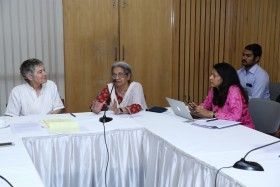
From left: Jennifer Leaning, Uma Chakravarti, and Meena Hewett. Chakravarti oversees the researchers work in India.
The 1947 Partition of British India represents the largest recorded instance of forced migration in human history. Despite abundant historical and political scholarship on Partition, and despite a growing literature of personal reflection and fiction, very little has yet been written from the humanitarian perspective about the experiences of people during their flight and temporary settlement.
The aim of the The 1947 Partition of British India: The Demographic and Humanitarian Consequences Project, led by Jennifer Leaning, François-Xavier Bagnoud Professor of the Practice of Health and Human Rights, Harvard T. H. Chan School of Public Health and Director, FXB Center for Health and Human Rights, Harvard University, is to develop a rich and empirically grounded understanding of Partition using the extensive archival records of British India—in the region as well as elsewhere. The project aims to explore questions such as: What prompted people to move, by what means of transport, along which routes? What difficulties did they encounter en route? Where did they depart from and where and how often were they required to relocate? How did people suffer and where did they find help? What efforts were made by government and civil society to mobilize relief and mitigate the myriad of severe consequences encountered along the lines of flight and migration?
The project aims to focus on the relief efforts and rehabilitation of refugees by government at all levels and by local or national organizations. The research team based in Cambridge has been working with research teams in Pakistan and India in this multi-site endeavor.
In August 2016 SAI hosted meetings in Lahore and Delhi, where Professor Leaning met with the in-region research teams to share research conducted to date and formulate plans for further research in the coming months. At both meetings, the teams discussed the ambition to write reports and narratives from a range of geographical perspectives and ultimately to share what has been found in an accessible and scholarly mode. SAI will coordinate and produce the initial output volume, to be released in or around August 2017, which will focus on the humanitarian consequences experienced by those on both sides of the Punjab border. Further research from both sides of the Bengal border and elsewhere is now underway and reports from these areas will be forthcoming.
